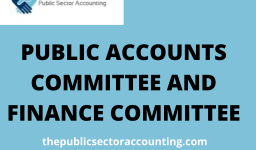Accountability is the obligation to give answers and explanations concerning one’s action to those with a right to require, or those with a reasonable expectation of receiving such answers and explanations.
Financial Accountability in the Public Sector basically means that those who are charged with carrying out public policies using public resources should be obliged to give an explanation of their action to their electorate; who may be a composite of interest groups of individuals as well as institutions.
Summary of Contents
WAYS TO IMPROVE ACCOUNTABILITY IN PUBLIC SECTOR
This article will help us to identify the ways to improve accountability in the public sector.
READ ALSO: PUBLIC SECTOR ACCOUNTABILITY
Here are five key ways to improve accountability in the public sector or public sector accountability
1) Make sure that the accounting application for providing an accurate financial picture is at the core of the entire PFM system.
Many countries have introduced acquisition accounting systems but they do not use the information provided in decision making. Beyond cash flow and external flow reports, earnings accounting also examines assets and liabilities and provides a more complete and accurate picture of a company’s financial condition.
Yet when governments make financial and budgetary decisions, there is the confusion of resources, financial resilience decreases, financial risk increases and transparency decreases, these income tax figures are often not used.
2) Apply a comprehensive system approach to improve control.
A PFM model of a comprehensive system approach ensures that the components of a PFM system work in a coherent manner and reinforce each other.
RELATED STUDY: WHAT IS THE MEANING OF PUBLIC PROCUREMENT?
Very often budgeting and accounting, for example, work on different arrangements of resource flows and budget positions. Through a comprehensive system approach, the powerful PFM brings all the core components of the system together with a single structure, ensuring that the system operates efficiently and consistently.
In July, the Chartered Institute of Public Finance and Accountancy (CIPFA) launched a new web portal to help companies implement a comprehensive system approach.
3) Decrease tolerance for corruption, including big data and analysis.
Big data and data analysis can significantly strengthen the fight against corruption. These tools allow the government to identify such fraudulent behaviours and activities.
RELATED STUDY: WHAT IS THE PURPOSE OF PUBLIC PROCUREMENT
For example, the European Commission has introduced data analysis software that cross-references data between public and private sector entities to identify conflicts of interest.
To ensure the adoption and implementation of such programs, the political system must lean towards reducing corruption.
4) Regularly publish the official financial statements of the government.
To ensure an ongoing public review of the government’s financial condition, full financial statements (based on earnings accounting) should be published on a regular basis.
READ ALSO: WHAT ARE THE 7 STAGES OF PROCUREMENT?
New Zealand publishes monthly accounts within the last six weeks of the month, meaning that ministers are much more financially aware and accountable as the public becomes more aware of any negative financial impact of government decisions and draws public attention.
5) Properly plan the reform.
Reforms to PFM systems need to be properly planned to ensure that the government has the necessary resources. Most countries face a variety of challenges, including updating existing laws and regulations, identifying and measuring all their resources and liabilities, and developing IT systems.
Governments need to be aware of how to bring about effective change in the medium term. If there seems to be much to be done to support reform at the planning stage, it only highlights the poor state of their existing PFM systems and therefore the greater need to improve their management processes.
READ ALSO: HOW DOES GOVERNMENT PROCUREMENT WORK?
By no means are these the only means to improve PFM. But if implemented, they should go a long way to improve performance within the sector and consequently to improve trust and confidence in political institutions.






Leave a comment